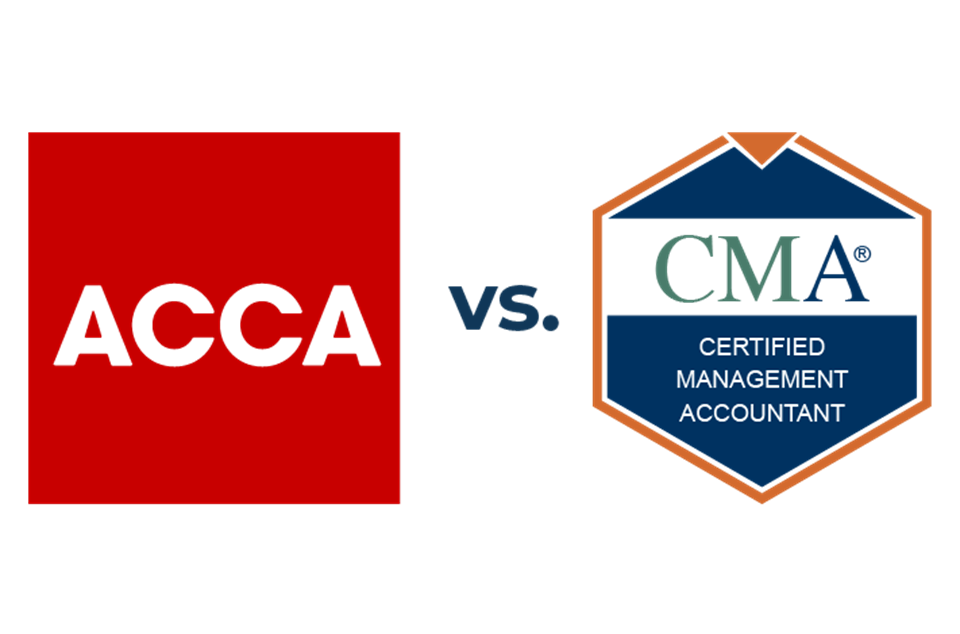
ACCA vs CMA: Understanding the Difference, Which is Better?
If you want to build a career in accounting but not sure what is ACCA and what is CMA, then you must read this article. There are several courses in finance and accounting that you can pursue in order to build a successful career in the field. ACCA and CMA course are two such professional certifications in accounting that are highly regarded across the world.
In the financial sector, you will be prepared and desirable to employers across multiple opportunities after pursuing either of these two courses. But ACCA vs CMA – which will be better for you? This question can only be answered once you know all about the ACCA and CMA courses.
Continue reading to know and understand the difference between ACCA and CMA and figure out which one of these courses is the right one for your professional career.
What does ACCA stands for?

Before opting for ACCA study, let us understand more about it! ACCA stands for the Association of Chartered Certified Accountants, which is an internationally recognised educational body offering accounting qualifications. ACCA has a community of over 241,000 members across 178 countries including Dubai. ACCA offers knowledge of accounting and finance and ethical values required in organisations across industries.
“More than 542,000 students from about 180 countries have passed ACCA.”
1. Requirements to Qualify for ACCA Study
You can study ACCA in Dubai and get the qualification after fulfilling the following criteria:
- You need to complete a maximum of 13 exam papers; however, it depends on your previous qualification and experience. (As you might get exemptions based on previous qualifications)
- You need to complete the online module on Ethics and Professional Skills.
- You need to submit practical work experience of at least three years in the relevant role.
With these parameters, you need almost three years to complete the ACCA qualification.
2. ACCA Course Eligibility Criteria
You don’t need to fulfil formal requirements to study ACCA in Dubai. Generally, you can study an ACCA programme no matter if you have an academic background. However, the basic eligibility requirements to pursue an ACCA study include:
- An intermediate level of English. If you want to improve your English level, you can check out our English Path courses.
- There are two A-Levels and three GCSEs required, including English and Math.
- International students will need a passport and transcripts from high school to study ACCA in Dubai.
- Students in the UAE will need school transcripts, an Emirates ID (front and back), a passport, and visa pages.
- Students in the UAE on a visit visa will need school or university transcripts, visa documents, and a passport.
If you don’t have these qualifications, you can join ACCA via Foundations in Accountancy (FIA) route and later progress to ACCA qualification.
3. Why Choose ACCA Course?
As an ACCA member, you will gain the tools to take businesses to the next level. You will become a strategic thinker and a person with high integrity along with excellent financial understanding. Besides understanding what is ACCA and gaining the ACCA Qualification, you will earn the following during your qualification:
- Become a member of one of the world’s largest and globally recognized accountancy bodies with ACCA programme.
- Opportunity to Get BSc (Hons) in Applied Accounting from Oxford Brookes University after passing nine exams of ACCA by submitting a Research project.
- Pathway to get MSc in Professional Accountancy from University of London by completing two modules and one research project
- Open the ways for multiple career opportunities for yourself after gaining the ACCA qualification.
- Learn ethical practices during the ACCA programme which will help maintain the high ethical standards of the organisation you are a part of.
- Get resources, advice, forums and insights during your study and professional journey after completing the ACCA programme.
- Develop and learn new skills and get an opportunity to gain multiple qualifications after the ACCA programme.
What is CMA?
Certified Management Accounting (CMA) is an internationally recognized accounting course. CMA is certified by the Institute of Management Accountants (IMA), which offers licences to students after pursuing the CMA course. A CMA-qualified professional gains experience in financial decision-making with a strong understanding of key accounting principles. As a certified CMA professional, you can work in corporate financial accounting, strategic management and many other career paths.
1. What is the Process of CMA Training Courses?
The CMA Qualification has two exams, which you need to complete within 12 months.
CMA Part 1: Financial Planning, Performance, and Analytics
CMA Part 2: Strategic Financial Management
After the successful completion of both exams, you will receive the CMA credential. These credentials will allow you to practise as Certified Management Accountant.
After pursuing a CMA course, you will gain these two advantages in your resume:
- Improved problem-solving abilities.
- Stronger analytical skills.
CMA training courses will allow you to begin an exciting career journey filled with the required skills and qualifications. If you want to become a successful management accountant, check the eligibility criteria below for the CMA course.
2. What are CMA Course Eligibility Criteria?
To earn the CMA certification, you will be required to meet the following standards:
- Hold an IMA membership for CMA.
- Complete and pass part 1 and part 2 of the CMA Exam.
- Earn a bachelor's degree from an approved college/university.
Note: If you do not have a bachelor's degree in an accounting domain, you can also earn a professional certification.
3. Why Pursue CMA Course?
CMA focuses on developing countries in general by offering accounting courses. When you finish your CMA, you will have the skills and expertise to work for any Fortune 500 company.
The CMA training course offers both certification and open doors for career opportunities with higher compensation.
CMA requirements
As a CMA candidate,:
- You must have worked in management accounting or financial management for a minimum of two years.
- You must hold full-time professional experience, if possible. You should work continuously for a minimum of 20 hours per week. Part-time roles are also counted at a rate of one year parallel to two years worked.
- If you are in a full-time teaching profession, and 60 per cent of the course includes accounting and finance above the introduction level.
Want to Study ACCA course in Dubai?
ACCA vs CMA: The Key Difference Between the Two

Are you confused between ACCA or CMA which is better? If this question is in your mind, then continue reading.
ACCA and CMA are both recognised qualifications for finance professionals in Dubai. The Government of Dubai has issued special regulations to practice either profession according to the need. Let us see the key differences between the CMA and ACCA courses as given in detail below:
| Sections | ACCA | CMA |
| Global Presence |
|
|
| Certification Organised By |
|
|
| Number of Levels |
|
|
| Entry Requirements |
|
|
| Mode of Exam |
|
|
| Pass Percentage |
|
|
| Job Opportunities |
|
|
You now have a more detailed understanding of the differences between ACCA and CMA. Both courses are valuable in their respective fields, but it’s important to look carefully CMA or ACCA which is better, considering the future career you want.
ACCA or CMA, which course is right for you?
When it comes to choosing the right course, you must do a lot of research to gain a clear understanding, if CMA or ACCA which is better. Choosing ACCA or CMA which is better depends only on which course fulfils your needs. It is essential to understand the course requirements and the job opportunities available for both courses.
Both ACCA and the CMA are valuable qualifications and better for you and can help you pursue a successful career. Be sure to do your research before deciding on which one is right for you!
If you need further assistance, connect with the GBS Dubai academic support team.
Frequently Asked Questions about ACCA vs CMA Course
ACCA or CMA which is better can be understood with knowing the key difference between CMA and ACCA is their global presence, the difference in salary after pursuing either course, pass percentages and value addition to the world and the candidate’s resume and skill set. Both courses open multiple career opportunities across the world. ACCA is what trains you to become Auditor, Tax consultant and financial advisor etc. but on the other hand what is CMA is, it is more inclined towards management accounting and corporate sector jobs.
Both CMA and ACCA are accounting and finance courses that have their own features and benefits. Both ACCA and CMA are better and offer jobs in the accounting and finance sectors but have key differences. For detailed differences, you can read the above table for more information!
Yes, you can do the Certified Management Accountant (CMA) course if you have done the ACCA. Even if you do not have a bachelor's degree but are a member of ACCA, you can go for the CMA afterwards.
Depending on where you want to pursue these courses and want to work, the cost of these courses will vary. But we suggest you must understand the key criteria of both the courses and what they offer.
The pass percentage for CMA is nearly 20%, while the pass percentage for ACCA lies between 40-50%. The difficulty level of both courses depends on your prior understanding of the subject, level of practice and learning progress.
Both the ACCA and CMA are reputable and highly valued in their respective fields. Any course is best if you feel that it matches your requirements. Consider reading this write-up in full to find the key differences between ACCA and CMA in detail.
Browse our courses
GBS Dubai offers a wide range of industry-focused education courses, designed to fit around your busy schedule.